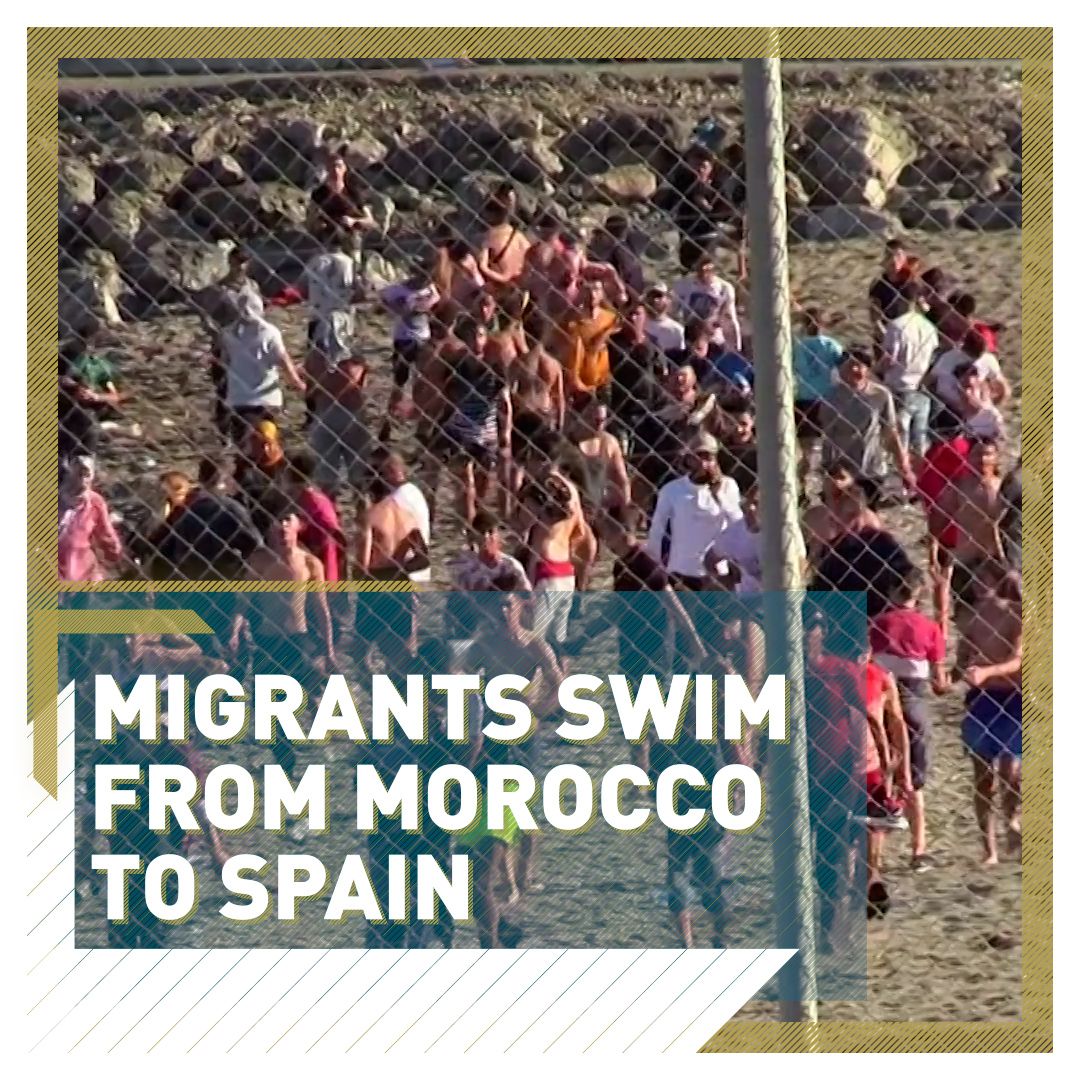00:50

Spain's prime minister has pledged to return the thousands of migrants who swam across the Spanish-Moroccan border to reach Spain's north African enclave of Ceuta on Monday and Tuesday.
In a televised address, Pedro Sanchez said: "My priority as Spain's prime minister at this moment is to guarantee the control of transit through the border with Morocco, provide the cities of Ceuta and Melilla with everything they need to resolve the humanitarian crisis as a result of the arrival of people and to proceed with the immediate return, I repeat, immediate return, of everyone who has made an irregular entrance to Ceuta and Melilla as stipulated in the agreements Spain and Morocco have signed years ago."
At least 6,000 Moroccan migrants, including 1,500 children, many with the support of rubber dinghies and inflatable rings, surged across the border in the apparent absence of Moroccan border controls.
Spain's Foreign Minister Arancha Gonzalez Laya also said she'd summoned Morocco's ambassador "to express our discontent and rejection of the mass influx of Moroccan migrants to Ceuta and reminded them that border control must be the joint responsibility of Morocco and Spain."
She also said the European Union would open a dialogue on migratory issues in the coming days. A spokesperson from the Spanish government's delegation in Ceuta reported that one person died during the perilous journey.
On Tuesday Spain said approximately 2,700 migrants had already been sent back to Morocco, where they were being accepted under a readmission deal.

Moroccan migrants climb rocks on the shoreline in the northern town of Fnideq as they attempt to cross the border from Morocco to Spain's North African enclave of Ceuta on May 18, 2021. /Fadel Senna/AFP
Moroccan migrants climb rocks on the shoreline in the northern town of Fnideq as they attempt to cross the border from Morocco to Spain's North African enclave of Ceuta on May 18, 2021. /Fadel Senna/AFP
Ceuta, with a population of 80,000, is a Spanish territory located on the northern tip of Morocco, across from Gibraltar.
The arrivals – in unusually large numbers, even for the area that attracts many migrants hoping to reach Europe – started overnight and continued during the morning.

A migrant climbs a breakwater after crossing the Spanish-Moroccan border in the presence of a Spanish civil guard in Ceuta, Spain, on May 17, 2021. /Reduan Ben Zakouor/El Faro de Ceuta/Handout via Reuters
A migrant climbs a breakwater after crossing the Spanish-Moroccan border in the presence of a Spanish civil guard in Ceuta, Spain, on May 17, 2021. /Reduan Ben Zakouor/El Faro de Ceuta/Handout via Reuters
Spain does not grant Moroccan citizens asylum status, but unaccompanied minors are allowed to stay in the country under government supervision.
All migrants have been detained upon arrival and authorities have already started sending some back to Morocco.
The prompt reaction of the Spanish government has been to deploy troops to Ceuta to patrol the border with Morocco, alongside Spanish police.

Moroccan security officers stand guard as migrants walk by the shoreline in the northern town of Fnideq in an attempt to cross the border from Morocco to Spain's North African enclave of Ceuta on May 18, 2021. /Fadel Senna/AFP
Moroccan security officers stand guard as migrants walk by the shoreline in the northern town of Fnideq in an attempt to cross the border from Morocco to Spain's North African enclave of Ceuta on May 18, 2021. /Fadel Senna/AFP
Bilateral relations between Morocco and Spain are quite tense at the moment over the fate of Brahim Ghali, the leader of the Polisario Front in Western Sahara, who is currently hospitalized in Spain.
Ghali and his party have led a long battle against Morocco for the independence of the Sahrawi people in Western Sahara. The area, which was a Spanish colony until 1975, is recognized by the United Nations as a "non-self-governing territory," while Morocco claims it under its sovereignty.
Spain has always been neutral on the issue of the Western Sahara, but the humanitarian reception of Ghali by the Spanish government is now fueling resentment and creating tensions between Madrid and Rabat.
Last month, Morocco's foreign ministry harshly criticized what it said was Spain's decision to admit Ghali under a false identity without informing Morocco.
Cover image: Fadel Senna/AFP
Source(s): Reuters

